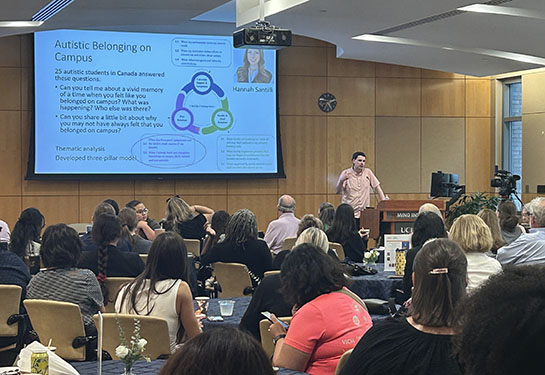UC Davis MIND Institute statement on acetaminophen and autism
The U.S. Department of Health and Human Services made a statement linking autism to the painkiller acetaminophen, commonly referred to by the brand name Tylenol. The department also recommended the use of leucovorin, also known as folinic acid, as a treatment for autism.
These are facts that we can share:
- Autism has no single known cause. The latest research shows both genetics and the environment play roles.
- Some studies seem like they show a link between Tylenol (acetaminophen) during pregnancy and autism, but there are other reasons that link might exist. These include similarities among family members and the reasons people took acetaminophen while pregnant.
- The number of people taking acetaminophen while pregnant has stayed the same or gone down while the number of autism diagnoses has gone up. If there was a link between these, we would expect both to go up or both to go down together.
- Untreated fever in pregnancy can pose serious risks to the fetus and to the mother. Acetaminophen is one of the few safe options to reduce fever during pregnancy.
- Leucovorin, also known as folinic acid (a modified version of B9), is a medication that is currently prescribed to help counteract the effects of some chemotherapy drugs used to treat cancer. It has been mentioned as a potential treatment for autism, but there has not been enough scientific research to know if this could work.
- More research is needed into this and other potential treatments to support autistic individuals.
The Secretary of Health and Human Services also referred to a study from the UC Davis MIND Institute on the increase in autism diagnoses. Though the MIND Institute can’t be sure what study he is referring to, it may be a 16-year-old study. The study did not indicate that autism was an epidemic, only that it was not possible to account for the total increase in diagnoses with the variables that they examined. This means they found there are many reasons we see more autism diagnoses. It was based on the best available information at the time, but the diagnostic criteria for autism have changed since the study was published.
Related Resources
The UC Davis MIND Institute in Sacramento, Calif. is a unique, interdisciplinary research, clinical, and education center committed to deepening scientific understanding of autism and other neurodevelopmental conditions. It is a highly collaborative center, bringing together families, researchers, clinicians, community leaders and volunteers with the common goal of developing more personalized, equitable, and scientifically proven systems of support and intervention. The institute has major research efforts in autism, fragile X syndrome, chromosome 22q11.2 deletion syndrome, attention-deficit/hyperactivity disorder (ADHD) and Down syndrome. More information about the institute and its Distinguished Lecturer Series, including previous presentations in this series, is available on the Web at https://health.ucdavis.edu/mind-institute/.



